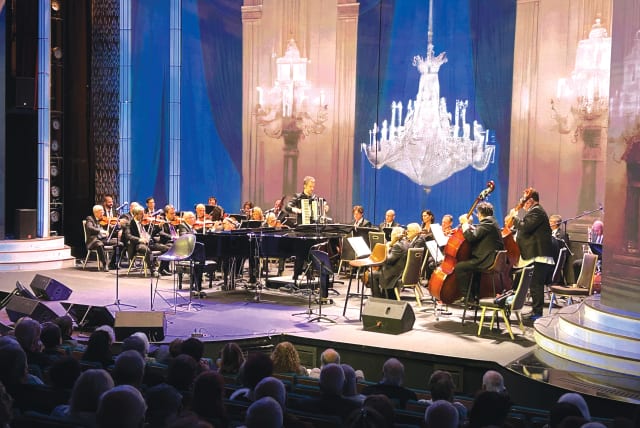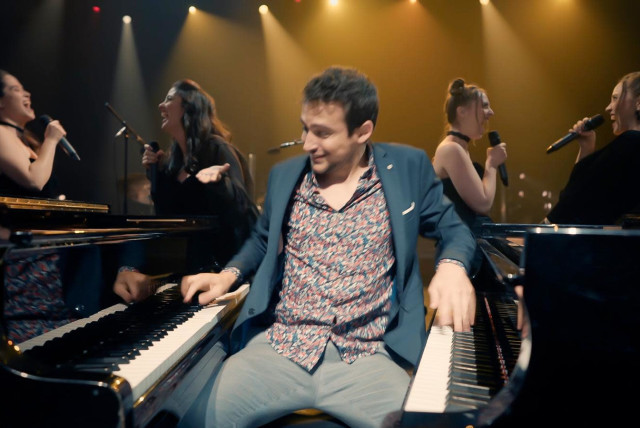Isrotel Classicameri Festival covers all bases in Eilat this year

Eilat, January 18-20: This year’s Isrotel Classicameri Festival did its best to cover all entertainment bases and produced some memorable spots in the process.
Everyone who made the trek down south to Eilat a couple of weeks ago for the Isrotel Classicameri Festival knew they were in for a rollicking entertaining time.
And so it was. Artistic director, conductor, composer, pianist, and accordionist Omer Wellber made sure of that, and there was some quality fare – and even artistically superior offerings – in the three-day mix too.
In our pre-festival chat, Wellber had “warned” me that the rendition of Mendelssohn’s Italian Symphony, on the first evening, could take all sorts of unexpected left-field twists and turns. That was exactly what we got, and more.
Then again, if you are going to take liberties with a classical piece that has been popular the world over for nigh on two centuries, you run the risk of putting a few noses out of joint. As Wellber declared, in his pre-performance preamble: “This concert is not for the ‘orthodox.’”
A concert that covered all bases
That it wasn’t. But with effervescent silkily skilled Guy Mintus at the piano, and turbo-charged Wellber conducting and laying on liberal helpings of joie de vivre on accordion, they and the Raanana Symphonette Orchestra duly took the jam-packed audience off for a roller-coaster ride with twist and turns aplenty. Mendelssohn’s original chart was deftly overlain and underscored with folkloristic and other popular Italian tunes. It all came together seamlessly and beautifully.
The other creative highlight of the three-dayer was Wellber’s delightful fusion of Vivaldi’s ever-popular Four Seasons together with a tribute work of the same name by 20th century Argentinean nuevo tango composer Astor Piazzolla.
Two deceptively similar scores dovetailed with gay abandon as Wellber oxymoronically punched out lyrically percussive harpsichord passages in the Piazzolla sections, and unfurled cascading accordion lines in the Baroque-leaning parts.
It worked well. In basic logistical and physiological terms alone, Wellber’s ability to play the harpsichord with a hulking accordion strapped to his front was particularly impressive. Yaki Reuven’s blistering mandolin work also caught the eye, ear, and heart.
The greatly-anticipated musical-theatrical performance of Prokofiev’s Lieutenant Kijé proved to be less than scintillating. Perhaps the naiveté of 1930s Soviet culture does not carry over too well into the 21st century. And the inclusion of a pair of classical ballet dancers in a couple of the concerts did not add to the artistic or entertainment value, Italian ballerina Giorgia Leonardi’s undoubted gracefulness notwithstanding.
Revital Hachamoff managed to stir the emotions in her heartfelt Roots Recital slot. She introduced us to her family, as she fed off the spirit and personalities of her grandparents, each of whom hailed from a different part of the world, and seasoned the pianist’s childhood and youth with an eclectic array of cultural baggage.
Indeed, she managed to invoke the textures, colors, and percussive rhythms of flamenco guitar and dance in her rendition of Albeniz’s Suite Espanola, Op.47, and really went to town with Chopin’s Ballade No. 4 in F minor Op. 52, reeling off mellifluous lyrical cascades galore.
The percussive offering from Tomer Yariv and the Tremolo Ensemble was one of the brightest fun sparks in the three-day program, as the marimba and xylophone players, and drummers ripped through an eclectic repertoire that spanned Dvorak’s Slavonic Dancers through Israeli composer Marc Lavry’s evocative Hora, to Mambo from Leonard Bernstein’s West Side Story.
From an artistic standpoint, the closing gala concert was mostly a damp squib as Wellber let it all hang out. Keen to up the entertainment ante we had pop singer Ran Danker putting out a pallid Hebrew language rendition of Jacques Brel’s quintessentially emotive Ne Me Quitte Pas, although Daniela Skorka, who normally earns a crust in the operatic sphere, added some class and compelling vocals to the proceedings.
The inclusion of a jolly delivery of Israel’s 1979 Eurovision Song Contest-winning “Hallelujah” was clearly aimed at the entertainment-at-all-costs common denominator, while there was a delightful operatic vignette by Symphonette resident conductor-pianist David Sebba who, it transpires, is a pretty decent vocalist too.
This year’s Isrotel Classicameri Festival did its best to cover all entertainment bases and produced some memorable spots in the process.
Jerusalem Post Store
`; document.getElementById("linkPremium").innerHTML = cont; var divWithLink = document.getElementById("premium-link"); if (divWithLink !== null && divWithLink !== 'undefined') { divWithLink.style.border = "solid 1px #cb0f3e"; divWithLink.style.textAlign = "center"; divWithLink.style.marginBottom = "15px"; divWithLink.style.marginTop = "15px"; divWithLink.style.width = "100%"; divWithLink.style.backgroundColor = "#122952"; divWithLink.style.color = "#ffffff"; divWithLink.style.lineHeight = "1.5"; } } (function (v, i) { });

